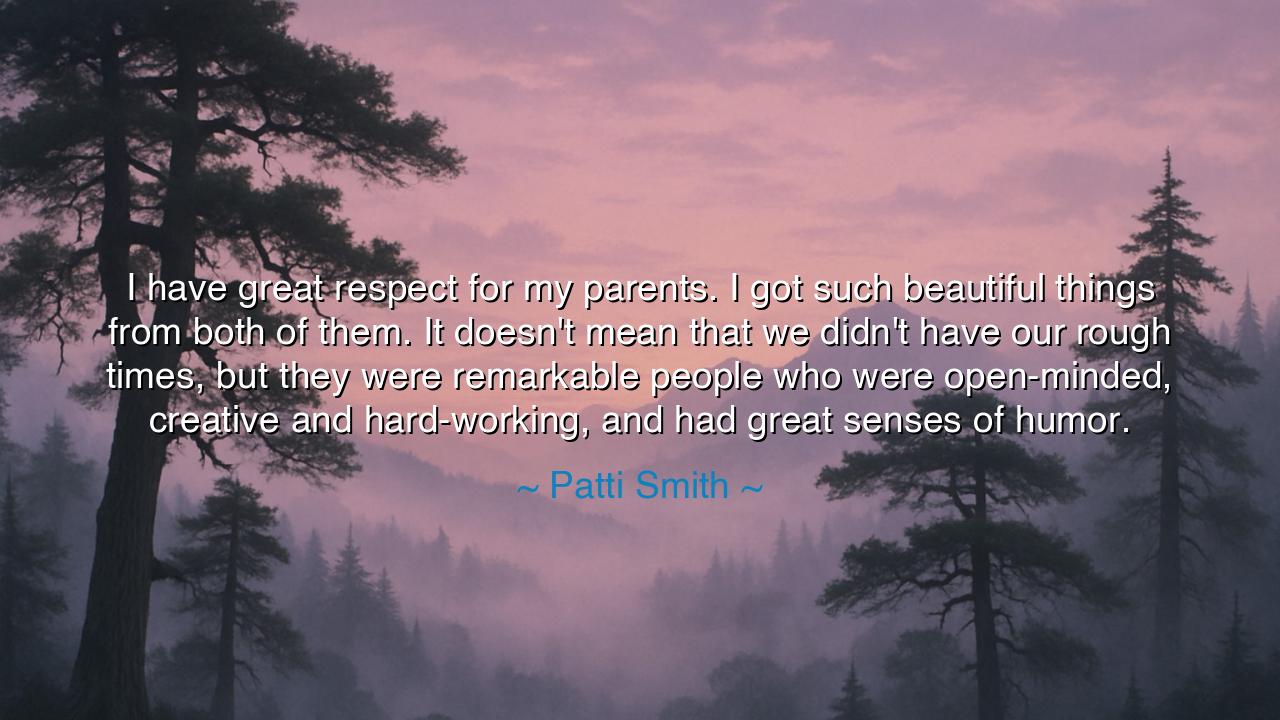
I have great respect for my parents. I got such beautiful things
I have great respect for my parents. I got such beautiful things from both of them. It doesn't mean that we didn't have our rough times, but they were remarkable people who were open-minded, creative and hard-working, and had great senses of humor.






In the vast, intricate web of existence, where every thread is woven with the stories of those who came before us, there is one force that shapes us more than any other—the family. It is within the embrace of our parents that we are first introduced to the world, where we begin to learn the values, principles, and virtues that will guide us throughout our lives. When the great Patti Smith spoke of her parents, she said, “I have great respect for my parents. I got such beautiful things from both of them. It doesn't mean that we didn't have our rough times, but they were remarkable people who were open-minded, creative and hard-working, and had great senses of humor.” In these words, she reveals the profound impact that parents—with their flaws and their virtues alike—can have on the shaping of a soul, and the values they pass down as both a legacy and a gift.
In the ancient teachings, respect for one's parents was considered one of the highest virtues. Confucius, the great philosopher, often spoke of the reverence owed to parents. He taught that the foundation of all moral behavior begins in the home, with the respect we show to those who brought us into the world. But it was not a blind or unquestioning respect; it was a respect built upon the understanding that parents, though far from perfect, are the ones who give us the tools to navigate the world. Patti Smith echoes this ancient wisdom in her tribute to her parents. She acknowledges that their lives were not without challenge, but the beauty of their contributions to her own life is undeniable. Her respect for them is rooted not just in their successes, but in the struggles they endured and the strength they displayed through those challenges.
Let us also look to the story of Marcus Aurelius, the Stoic philosopher-emperor, who revered his father deeply. Though he did not have the chance to know him well, Aurelius learned much from his father’s example—hard work, discipline, and a commitment to the common good. And in the same way, Patti Smith learned from her parents not just through the lessons they gave, but through their actions, their integrity, and the way they approached the world. She speaks of their open-mindedness, their creativity, and their humor—qualities that transcend the ordinary, qualities that endure even in the face of life’s inevitable struggles. These are the gifts her parents gave her, and through them, she is shaped into the person she has become.
Creativity and hard work—these two pillars stand at the heart of Smith’s reflection on her parents. In the ancient world, both were highly prized. Plato wrote extensively about the need for the artist to draw upon both the rational and the emotional in order to create something of lasting value. Similarly, Patti Smith’s parents instilled in her the importance of creativity and work—two forces that allow us to create something meaningful from the chaos of life. Creativity, however, is not something that springs from the void; it is nourished by the values, the experiences, and the teachings of those who came before us. Her parents, with their open minds, taught her that life is not just about struggle, but about finding joy, expression, and connection through the work we do and the joy we share.
Yet, as Smith so wisely points out, the path was not always smooth. There were rough times, moments when the strength of the family was tested, as it is in every household. Socrates, too, endured trials in his relationships with his family, yet he never lost his respect for them. He understood that family, in its deepest form, is not about perfection but about resilience and mutual support. Likewise, Patti Smith does not present an idealized picture of her family; rather, she honors the reality of their human condition—the imperfections, the struggles, and the love that persisted despite them. Her words are a reminder that even in hardship, there is much to be learned, and much to be grateful for.
The great lesson from Patti Smith’s words, and from the teachings of the ancients, is clear: respect for one’s parents is not based on their perfection, but on the gifts they give us—the values they instill, the strength they model, and the love they offer. In recognizing these gifts, we understand that the greatest inheritance we receive is not material, but moral, emotional, and spiritual. It is through the wisdom, creativity, and humor of our parents that we find our way in the world, and it is through their example that we learn to navigate life’s challenges with grace.
Thus, let us honor our parents, not as flawless beings, but as the guides they are, offering us wisdom through their lives, their struggles, and their love. Let us cultivate in ourselves the qualities they have passed down: creativity, hard work, and a sense of humor that helps us find light even in dark times. In doing so, we honor their legacy and build a path for future generations to walk, just as they walked before us. May we each strive to pass down these gifts—of wisdom, of joy, and of love—to those who come after us, as Patti Smith has done through her art, her words, and her enduring respect for the remarkable people who raised her.






AAdministratorAdministrator
Welcome, honored guests. Please leave a comment, we will respond soon